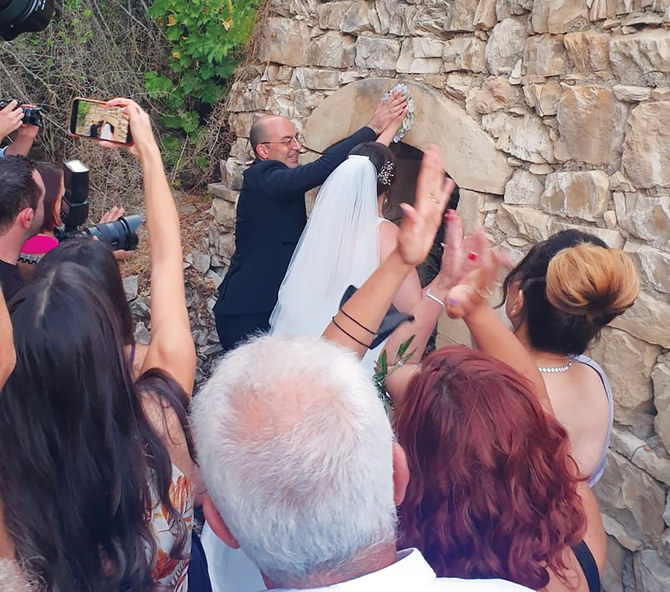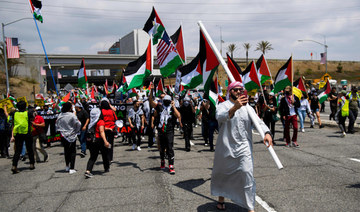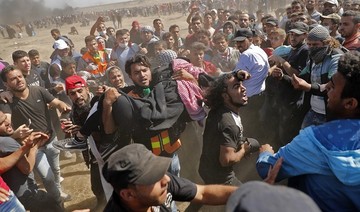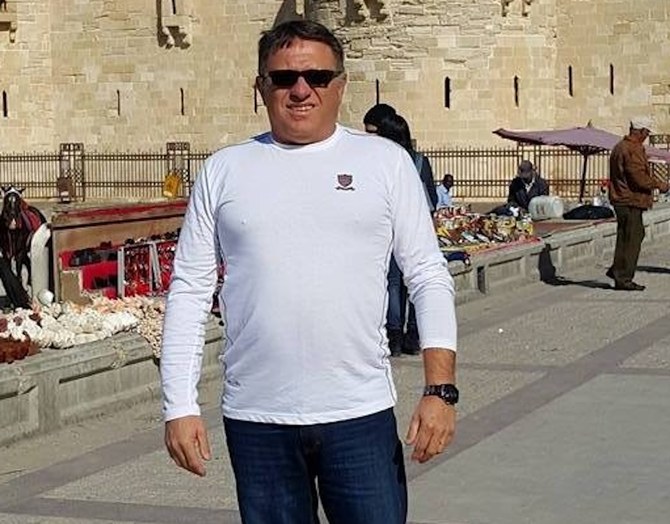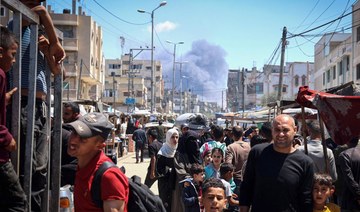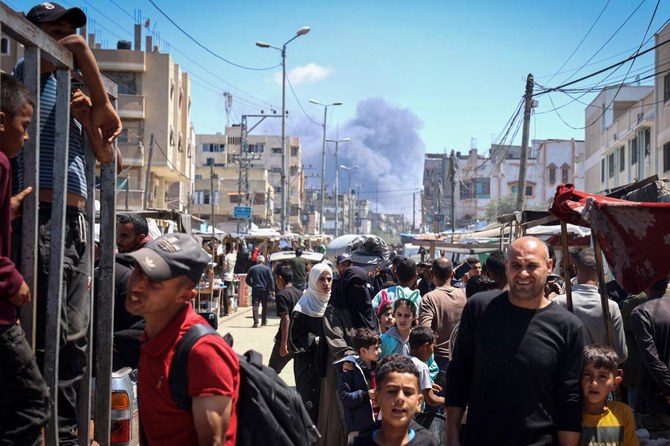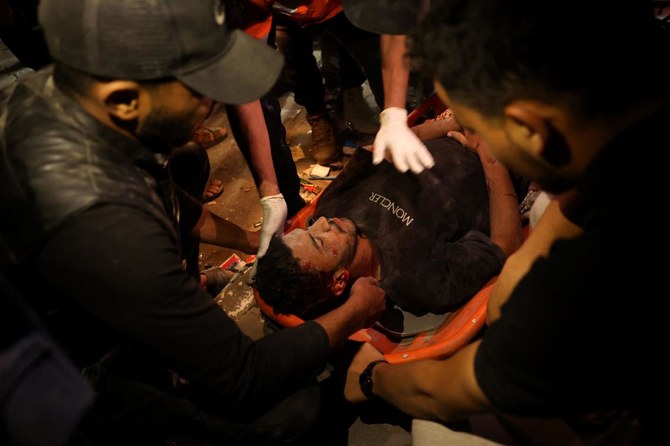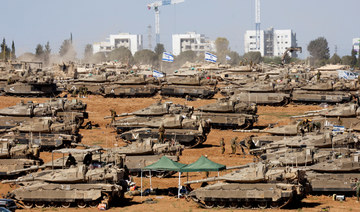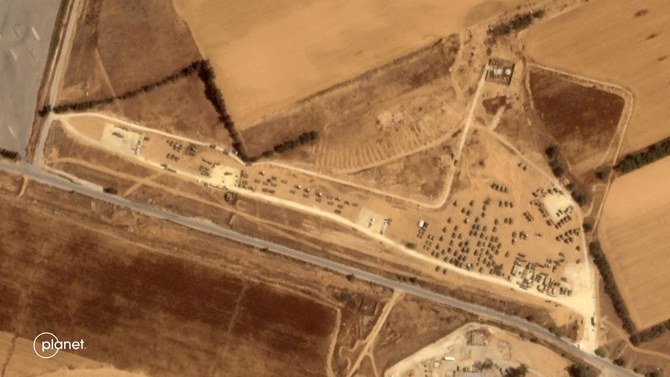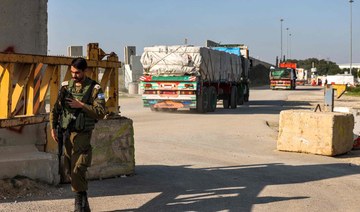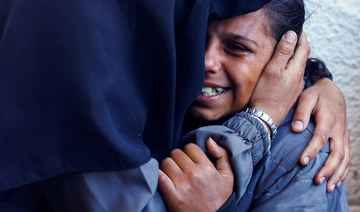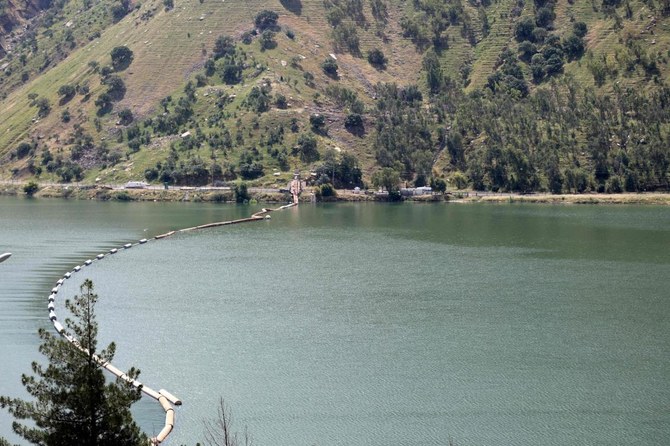AMMAN/NAZARETH: When George Ghantous, a Palestinian citizen of Israel, and Lauren Donahue, his American fiancee, were planning their wedding, there were lots of details that needed to be agreed upon. But the couple settled on one important decision from the outset: The wedding would take place in an abandoned church in the village of Biram, George’s ancestral home.
In 1948, during the war that resulted in the creation of the state of Israel, the people of Biram — a mainly Christian village high in the mountains of Galilee above Safed, not far from the Lebanese border — found themselves caught up in the fighting.
It was occupied by Israeli forces who, seven months later in a well-documented incident, expelled the residents of Biram as well as Iqrit, a village about 21 kilometers away.
Caught in the crossfire of a conflict between the Israeli army and Arab guerrillas operating from bases in Lebanon, the inhabitants of the two villages, who mostly made a living from cultivating fruit trees, were ordered to leave their homes for two weeks until the situation stabilized.
Seventy-three years later, the villagers and their descendants — now citizens of Israel, whose properties are supposed to be protected by Israeli law — still have not been allowed to return.
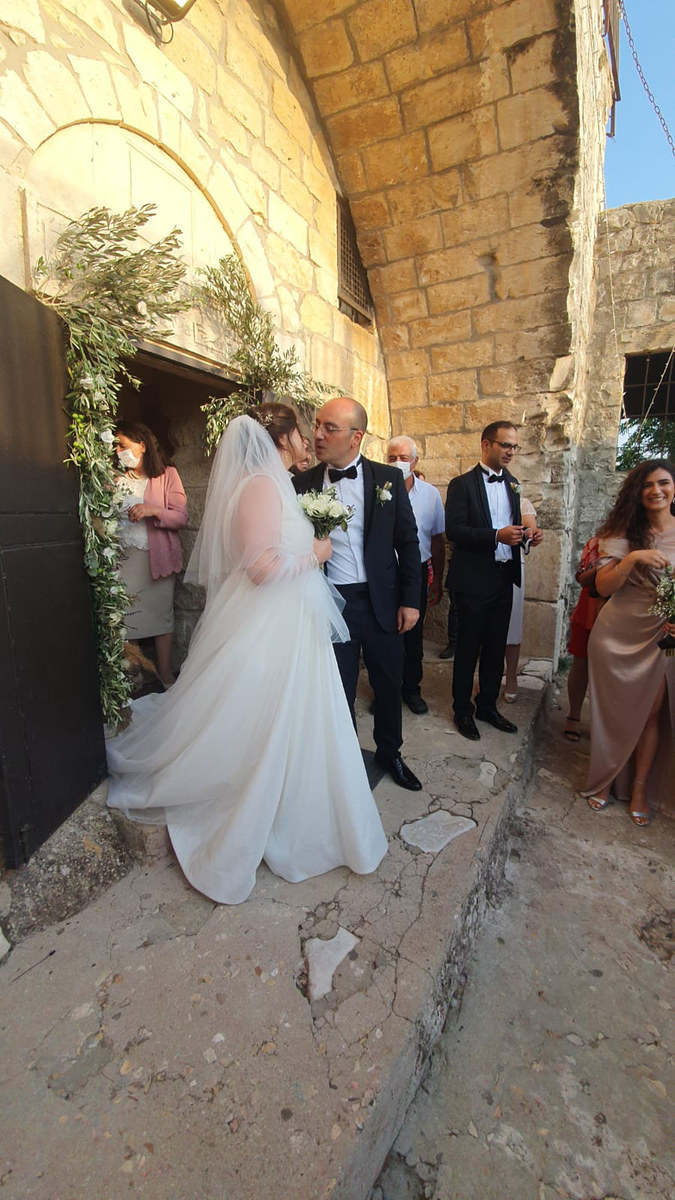
The couple seal their marriage vows with a kiss. (Supplied)
Worse still, despite an Israeli High Court decision in the 1950s upholding the villagers’ property rights, the Israeli army demolished, presumably as a deterrent to any future return, all the buildings in both villages except for a Melkite church in Iqrit and a Maronite church in Biram.
Maronites, who now live mostly in Lebanon, are a branch of the Syriac Church, which split from the Greek Orthodox faith in the seventh century. Melkites are another Syriac branch who adhere to old Byzantine rites.
In addition to having their wedding service at the church in Biram, Ghantous and Donahue visited the ruins of the house in the village where the groom’s grandparents once lived. There, they performed a traditional ritual that normally takes place at the home of the newlyweds.
The bride, dressed in white, and the groom, in black, stuck unbaked bread dough, decorated with flowers and coins as symbols of prosperity and happiness, to a lintel above the main entrance to what remains of the building.
“If, God forbid, the dough does not stick, then a shout of dismay is heard by the guests as this is bad luck and the marriage may be doomed,” Michael Oun, an authority on Middle East history and a relative of the groom, told Arab News. “When they make the dough, the groom’s family takes good care to make sure that it really sticks.”
Fortunately for the happy couple, the dough did stick. But in addition to marking the start of their married life together, the ritual also served as a political statement making it clear that even members of this third generation of Palestinian Christians have not forgotten the villages their families were forced to leave, and to which they one day hope to return.
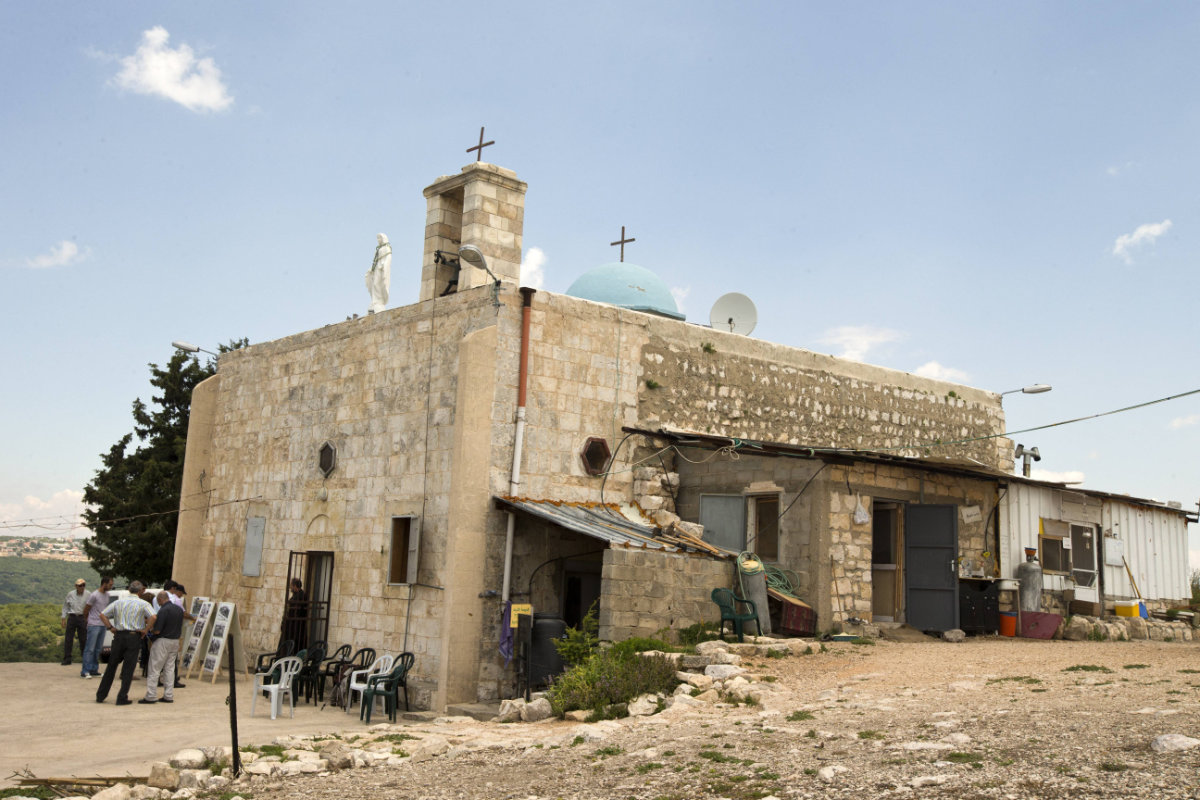
The abandoned Maronite church in Biram, George Ghantous’s ancestral home. (Supplied)
Ghantous said that he was made aware of his grandparents’ original home from an early age and has visited it on many occasions, at Christmas and Easter and to attend baptisms and weddings.
“We were raised in this beautiful place, under its sky and among the trees and the refreshing breeze,” he told Arab News. “Our spirit and our parents’ and grandparents’ spirits are here among the houses and among ourselves. It is natural that this would be the place where our joy is realized.”
Over the years, Israeli leaders of all parties have promised to help the villagers of Biram and Iqrit to return to their homes, only for the promises to be broken amid fears that it might encourage other Palestinians to demand the return of their ancestral lands and homes.
Rejecting the demand, Lior Haiat, spokesperson of the Israeli Ministry of Foreign Affairs, told Arab News that the official position on the issue remains unchanged.
Ayman Odeh, a member of Knesset and head of the Joint List, the main Arab bloc in the parliament, accuses Israeli authorities of paying lip service to the demands of the people from the villages, instead of taking corrective steps.
“Not only do they not have the will but they are unable to go beyond the security blockade,” he told Arab News.
Odeh claimed Reuven Rivlin, who served seven years in the mainly ceremonial role of president of Israel, once made a promise that he would not allow his term in office to end without the people of Biram and Iqrit being allowed to return.
“Rivlin’s term ended (in July this year) and his promise has not materialized, even though he was the highest authority in Israel, albeit a symbolic one,” Odeh said. “He clearly couldn’t bypass the instructions of the security agencies that form the deep state.”
Odeh said he also received assurances from Yitzhak Herzog, Rivlin’s successor as president, but these have yet to translate into action.
“I asked him to send a letter of support to the people of these two villages and he did,” Odeh said. “Now he is president and his first visit was to a Jewish settlement in the occupied territories.”
Ibrahim Issa was 14 years old when Biram was occupied and destroyed. He is now 87. When Arab News spoke to him on Sept. 10, he had just left church after the regular morning mass for older former residents of the village. He said he visits the village with his wife at least twice a week.
“I was raised in Biram and have eaten its figs and grapes, and played in its roads,” he said. “That is why I love it and cling to the hope of returning some time. I have been coming to Biram and stayed in the area after its demolition, even during military rule. I have followed the whole struggle for 73 years.”
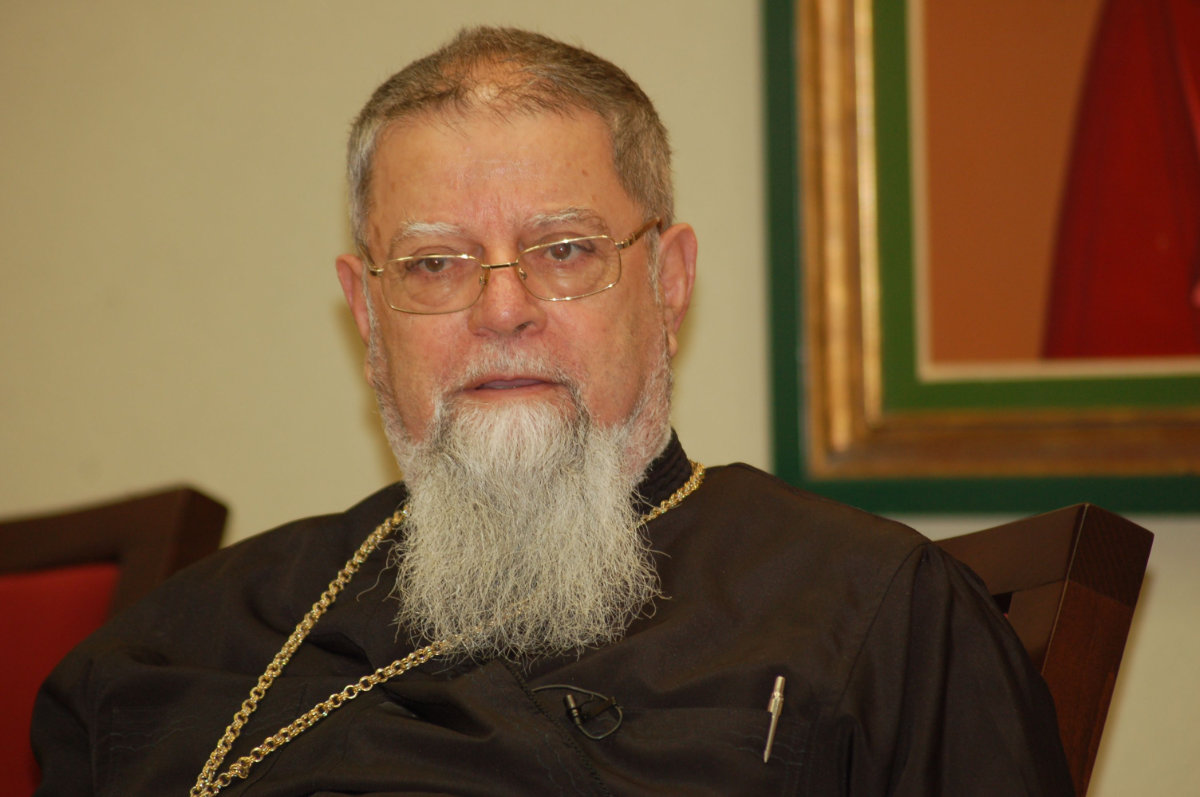
Bishop Elias Chacour of the Melkite Greek Catholic Church. (Supplied)
Bishop Elias Chacour of the Melkite Greek Catholic Church, perhaps the most famous former resident of Biram, is the author of “Blood Brothers,” a best-selling memoir of life as an Arab citizen of Israel.
Now retired, he was eight when the village was taken over by the military. He lobbied Shimon Peres, the Israeli former president and prime minister, to allow the residents to return.
“I told him: ‘I come to you as a son of Biram. Biramites are still alive,’” Chacour told Arab News. “Peres replied: ‘That was a long time ago.’ I told him: ‘You kept remembering Palestine for 2,000 years and then you traveled to Palestine and caused us damage and you want us Biram people to forget?’”
Chacour sees little hope of progress under the new Israeli government, but considers Mansour Abbas, an Arab citizen of Israel who leads the United Arab List in the Knesset, as the only politician capable of moving things forward. Still, he thinks Biram will endure.
“As long as the people of Biram and their descendants live and remember the village,” Chacour told Arab News, “Biram will not die.”
Iqrit and Biram: A brief history of expulsions
As fighting raged between Arabs and Jews in 1948, Israeli troops occupied Iqrit, a village of 616 residents. The leaders of the village signed a surrender document. The local priest reportedly even greeted the troops with a Bible in his hand while chanting in Hebrew, “Welcome, Oh children of Israel.”
A week later, the commander of the Israeli troops ordered the inhabitants of Iqrit to leave and travel southeast to the Arab village of Rameh “for two weeks until the security situation will allow them to return,” according to historical records. The villagers did as they were told, leaving most of their belongings behind.
The same fate befell Biram, a village with a population of 1,050. Its people also were ordered to leave for two weeks and given a promise that they would be allowed to return soon. They went to the nearby village of Jish, about 5 kilometers to the east, and moved into the homes of Muslims who had fled the fighting during the war.
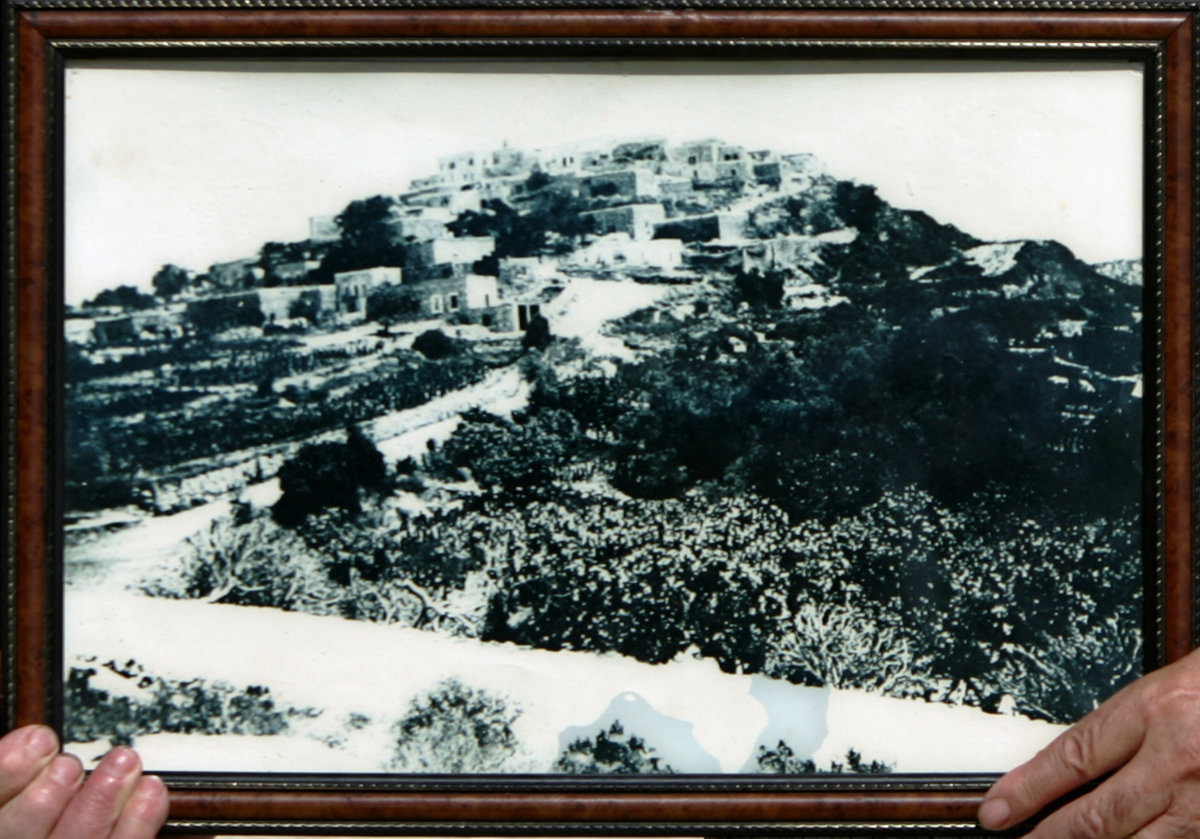
An old picture of the village of Biram before it was destroyed by Israeli forces. (Supplied)
The ruins of both villages are located a few miles from the border with Lebanon. Iqrit is about 21 kilometers to the west of Biram. The residents of the former were Melkite Greek Catholics and the latter were mostly members of the Maronite church. Both are eastern sects of the Catholic church.
When the residents of Iqrit failed in their efforts to ensure the authorities would keep their promise and allow them to return to their homes, they appealed to the Supreme Court of Israel. In July 1951, the court ruled that they should be allowed to return. The Israeli army ignored the decision and demolished the village on Christmas Eve, 1951, leaving only the church standing.
Biram fared no better. Its appeal to the High Court failed on a technicality and Israeli fighter jets demolished the village in July 1953. Former residents watched its destruction from a place that later became known as “Wailing Hill.” Again, only its church was spared.
Soon after, large sections of land near Biram were designated public parks. Other areas were incorporated into new Jewish settlements. In 1968, with the end of military rule in Israel, former residents and their families were granted the right to be buried or get married in Biram.
_________________
• Daoud Kuttab in Amman and Botrus Mansour in Nazareth




